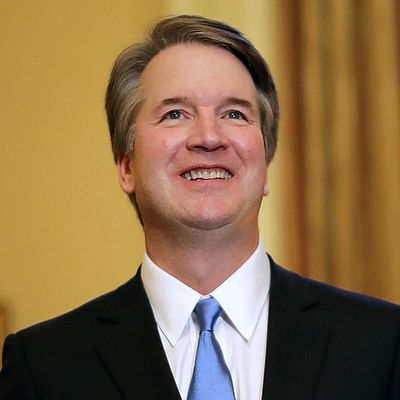
The battle to nail down every Senate Republican vote for Brett Kavanaugh’s Supreme Court confirmation took a significant, albeit somewhat predictable, turn today, as the Washington Post reports:
Sen. Susan Collins (Maine) told reporters on Tuesday that she asked President Trump’s pick about whether he considered Roe to be settled law. Collins said Kavanaugh told her he agreed with current Chief Justice John Roberts, who said during his 2005 confirmation hearing that Roe was “settled as a precedent of the court.” Collins and Kavanaugh met for more than two hours on Tuesday morning.
This is likely the “cover” Collins sought and secured in order to square her own pro-choice position with the vote for Kavanaugh her party expects her to cast. But if she claims it means Kavanaugh won’t participate in an effort to overturn or significantly modify Roe, she’ll likely be cooperating with Kavanaugh — and with John Roberts — in more than a bit of a scam.
It’s actually a bit of a no-brainer to say that the constitutional right to choose, decided 45 years ago in Roe v. Wade and emphatically reconfirmed (not in every detail but in its constitutional fundamentals) by Planned Parenthood v. Casey 26 years ago, is “settled law.” That means lower courts must follow it as a binding precedent. But for SCOTUS itself it simply indicates a degree of deference unless some stronger constitutional consideration is found to override it. So it does not guarantee that the “settled law” will be respected by the justices that acknowledge it. And as Irin Carmon recently observed, that’s demonstrably true of Chief Justice John Roberts:
At his nomination hearings, Roberts declared Roe “settled as a precedent of the court” and said: “I do think that it is a jolt to the legal system when you overrule a precedent. . . . It is not enough that you may think the prior decision was wrongly decided.” Does that mean he would stop short of undoing the court’s abortion cases, which were upheld as recently as two years ago?
Not necessarily. On favored causes such as money in politics and this term’s union-fees case, Roberts has helped leave precedents and principles in tatters. You don’t even have to look past abortion itself: In 2000’s Stenberg v. Carhart, Justice Sandra Day O’Connor cast the deciding vote to strike down a state ban on “partial birth abortion,” citing the court’s precedent in Casey. By the time the federal version of the same law reached the court, in 2007’s Gonzales v. Carhart, O’Connor had been replaced by Samuel A. Alito Jr., and with his help, the court’s conservatives, including Roberts, eagerly teamed up to overrule the precedent.
And even if Roberts and Kavanaugh are reluctant to support the kind of frontal assault on abortion rights that, say, Clarence Thomas is eager to undertake, that hardly rules out an incremental gutting of Roe. As recently as 2016, Roberts was in the minority in a key decision protecting abortion rights from state laws aimed at driving abortion providers out of business. And as Carmon points out, Roberts patiently used two cases — one in 2009, another in 2013 — to wreck the “long-settled” enforcement provisions of the Voting Rights Act of 1965.
The most important thing to keep in mind in parsing this carefully constructed assurance Kavanaugh offered to Collins is the broader context of Kavanaugh’s nomination (and before him, that of Roberts, Alito, and Gorsuch): the iron determination of Republicans since at least the George W. Bush administration to atone for the GOP-appointed justices — the longest-lasting being Anthony Kennedy — who supported abortion rights. Uncertainty on this score was a major factor in the conservative uprising against Bush’s second Court nominee Harriet Miers. And the search for certainty on hostility to the “liberal judicial activism” epitomized by Roe led eventually to Donald Trump’s smart decision to let conservative legal beagles vet his own SCOTUS list. It would be shocking if this process and the politics behind it produced a justice who looked at SCOTUS precedents on abortion and pronounced them unassailable.
Yes, Kavanaugh, like Roberts, might be inclined to undertake the project of overturning abortion rights carefully and with an eye to avoiding any open contempt for the eventual victims of a counter-revolution on this subject, particularly given strong public support for Roe. But no one should believe the precedent is safe. And no one should accept that Susan Collins believes it either.






























